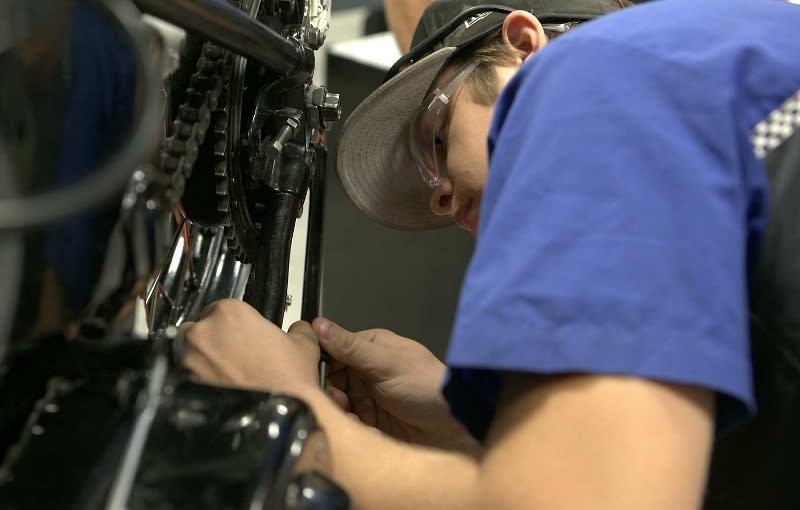The allure of the open road is creating more motorcycle enthusiasts around the country. The Motorcycle Industry Council reports motorcycle ownership in the United States has increased from 6.94% in 2014 to a record 8.02% in 2018, an increase of more than 1.5 million homes with motorcycles. Motorcycle mechanics — also called motorcycle technicians — diagnose, maintain and fix bikes for the growing number of riders.
If working with your hands, using mechanical know-how, and diagnosing and fixing problems appeals to you, a career as a motorcycle mechanic could be your calling.1 You get to work on bikes and meet with customers who share the same passion for motorcycles that you have.
Learn more about skills motorcycle mechanics need, what their job outlook and salary are, and how to become one in this motorcycle mechanic guide.
Motorcycle Mechanic Job Description
Motorcycle technicians inspect, service and repair motorcycles. Usually, motorcycle technicians have small-engine training, which means they’re also able to work on all-terrain vehicles, side-by-side vehicles and personal watercraft.
Small-engine mechanics typically specialize in one area, becoming a motorcycle mechanic, motorboat mechanic or outdoor power equipment mechanic. They also have the training to work on scooters, mopeds and dirt bikes. If a vehicle is powered by a small motor, a motorcycle mechanic has the know-how to keep it in shape.
Motorcycle mechanics are responsible for testing performance and driveability, troubleshooting small-engine vehicles and diagnosing engines. They may work for motorcycle dealerships servicing and fixing specific types of bikes, or they may work on all types of bikes in repair shops. Some motorcycle technicians own their own businesses.
Some self-employed motorcycle mechanics go directly to clients to fix their bikes on-site.
Some motorcycle mechanics, go on to create custom bike shops.
Typical Motorcycle Mechanic Duties
A day in the life of a motorcycle mechanic is hands-on and brings diverse challenges, depending on the bike and related issues. Motorcycle technicians use a variety of tools and hand-eye coordination skills to do repairs, replace parts, rebuild engines, and work on electrical, mechanical and fuel-system problems.
The daily duties of a motorcycle mechanic may include:
- Communicating with customers about problems and solutions
- Maintaining engines with parts lubrication and spark plug replacement
- Testing engines for malfunctioning parts
- Reinstalling and reassembling engines and components
- Maintaining repair records
- Carrying out piston calibration and hand calibration
- Tuning racing motorcycles
- Servicing engines, brakes, transmissions and ignition systems
- Making minor body repairs

Motorcycle mechanics use hand tools like pliers, wrenches and screwdrivers, as well as a variety of computerized and pneumatic equipment to do their work. Most motorcycle technicians work full-time, with the busy seasons typically being spring and summer because of nice weather and more motorcycles on the road for events. During off-peak seasons, motorcycle mechanic work may include major repairs, such as rebuilding engines.
How to Become a Motorcycle Mechanic
If you’re interested in becoming a motorcycle mechanic, proper training is essential because the work can be dangerous if you don’t know what you’re doing. While some motorcycle mechanics have started their careers with on-the-job training, these days most employers prefer to hire those with formal motorcycle mechanic training.
According to the U.S. Bureau of Labor Statistics (BLS), employers tend to hire mechanics with technical training and a postsecondary nondegree award from a school like Universal Technical Institute (UTI). That’s because formal education decreases the time required for on-the-job training, which saves employers money and enables motorcycle mechanics to get to work quickly. It also improves safety around the shop.
If you’re wondering how long motorcycle mechanic training is, UTI’s Motorcycle Technician programs take 48 weeks to complete.7 Students get hands-on training and classroom experience focused on key components of motorcycle technology. Students learn about engines, transmissions and precision measurement, chassis, suspension and final drive, electrical systems, vehicle maintenance, electrical diagnostics and engine troubleshooting, and noise diagnosis.
After completing the Motorcycle Technician Prerequisite (MTP) program at UTI, students can take manufacturer-specific training on individual motorcycle brands. Some dealerships require motorcycle MSAT training in order to be considered.
Manufacturer programs offered at UTI include:
- Harley-Davidson Late Model
- Honda HonTech
- Yamaha YamaPro
- Factory Authorized Suzuki Training (FAST)
- Kawasaki K-Tech
- BMW Motorrad
Graduates of the Harley-Davidson Late Model course also can go on to complete Harley-Davidson Early Model and Harley-Davidson Screamin’ Eagle® training.
There is no limit to the number of manufacturer courses you can take. Aspiring motorcycle mechanics who want to be well-rounded and work with all types of models may choose to complete as many motorcycle mechanic courses as possible.
Motorcycle Mechanic Salary & Job Outlook
As long as there are riders on the road, the need for skilled motorcycle technicians remains. Motorcycle enthusiasts around the country and the world look to technicians to keep their bikes up and running.
When it comes to salary, the median annual salary for motorcycle mechanics in the U.S. was $46,270 in May 2023, according to the BLS.30 This means half of motorcycle technicians earned more and half earned less. Keep in mind that motorcycle technician salary depends on several factors, including experience, employer, demand and cost of living in the area.
Interested in Motorcycle Mechanic Jobs? Get Trained at UTI
If you’re interested in becoming a motorcycle mechanic, an education from UTI can help. Often, employers recruit candidates directly from UTI, working with Career Services to get candidates who have knowledge on the bikes they need serviced.
UTI has campuses in Phoenix, Arizona, and Orlando, Florida. Classes start every six weeks, so any time is a great time to jump-start your career in the motorcycle industry.
Learn more about UTI's Motorcycle Technician program. Request information or apply today.



